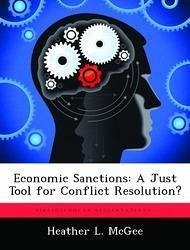Economic sanctions are a form of non-violent warfare that has been used more frequently over the past fifty years to change the behavior or policies of a target state. This research paper will determine if economic sanctions can successfully coerce a target state to comply with the sender's military or political position without violating the principles of just war doctrine. Research and analysis of previous case studies, along with the ethical and moral implications of those sanctions with or without jus in bello applications, will help determine if economic sanctions can succeed without just war doctrine violations. Most existing literature states that when there is significant cooperation amongst senders, and the target state is economically and politically weak, sanctions are likely to be successful. However, little information exists on the success factor when sanctions are applied under the principles of just war doctrine, and more specifically, jus in bello (just conduct in war). Since sanctions are imposed under varying degrees of cooperation, the cases are separated into 3 separate categories for analysis: coincidence (significant cooperation), coercion (moderate cooperation), and co-adjustment (little to no cooperation). While it was expected to find sanctions more successful under full cooperation, the research showed that in almost every case, economic sanctions did not meet the defined success criteria and jus in bello was oftentimes violated. Given that the use of sanctions is increasing as the preferred tool of modern warfare, more needs to be done to ensure sanctions are applied without harming vulnerable members of the target society.
Hinweis: Dieser Artikel kann nur an eine deutsche Lieferadresse ausgeliefert werden.
Hinweis: Dieser Artikel kann nur an eine deutsche Lieferadresse ausgeliefert werden.








